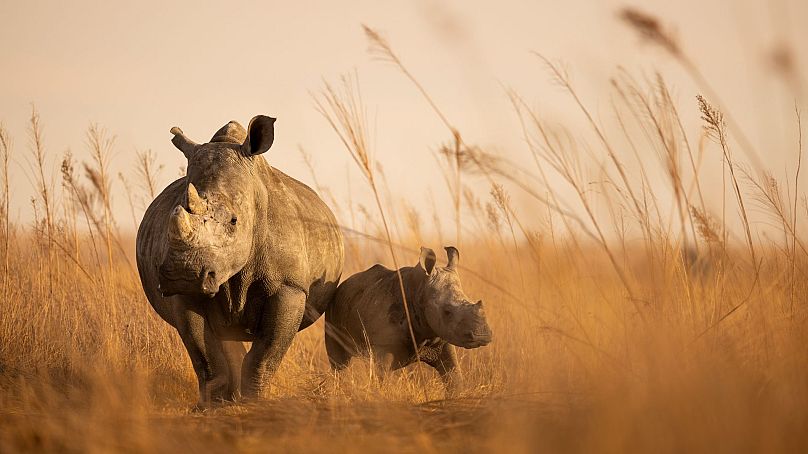2,000 captive white rhinos are set to be released in a 10-year rewilding project across Africa.
A South African NGO has purchased the world’s largest captive rhino breeding operation. It now plans to rewild the animals across the continent.
 ADVERTISEMENT
ADVERTISEMENT
 ADVERTISEMENT
ADVERTISEMENT
African Parks stepped in after an online auction of breeder John Hume’s 2,000 rhinos failed to receive any bids.
Over the next 10 years, the conservation organisation intends to relocate the animals to protected areas across the continent to help secure the species’ future.
Why were 2,000 white rhinos being sold in an online auction?
Former billionaire John Hume ploughed his fortune into building the world’s largest rhino farm in 2009.
Located in Klerksdorp, 170 km southeast of Johannesburg, the highly-guarded farm cost more than $425,000 (€396,000) per month to run, according to auction documents.
A large portion of this went towards security, while costs soared higher in recent years due a prolonged drought that drove up the price of feeding the animals.
To further dissuade poachers, the horns were cut off the rhinos on Hume’s farm. This doesn’t hurt the rhinos but it may alter their behaviour and have long-term consequences. If cut correctly, the horns can grow back in time.
In 2017, the controversial entrepreneur won a legal battle to lift the 2009 ban on domestic trade of rhino horns in South Africa, despite an international ban. This was both in a bid to fund his conservation project and purportedly to reduce the value of horns on the illegal market.
In 2016, CNN reported that the farm had almost 10 tonnes of horns worth almost €500 million. In 2015, the value of rhino horns exceeded that of gold and cocaine.
In April, unable to afford to keep running the 7,800-hectare farm, Hume put it up for online auction.
The price paid by African Parks has not been disclosed but the auction, which ended in May, opened for bids starting at $10 million (€9.3 million).
What will African Parks do with the rhinos?
African Parks is a conservation NGO. It manages 22 national parks in 12 African countries, in partnership with governments and local communities.
With the support of the South African government, it plans to rewild the 2,000 southern white rhino, which will represent up to 15 per cent of the world’s remaining wild population.
The NGO says it is experienced in managing protected areas and translocating wildlife in large numbers, including bringing rhinos back to Rwanda, Malawi and the Democratic Republic of Congo.
It secured emergency funding to purchase the rhinos and protect them from potential poaching and fragmentation.
Over the next 10 years, it plans to relocate the rhinos to well-managed and secure areas, establishing or supplementing strategic populations to secure the future of the species.
“The scale of this undertaking is simply enormous, and therefore daunting,” says Peter Fearnhead, CEO of African Parks. “However, it is equally one of the most exciting and globally strategic conservation opportunities.”
It will be one of the largest continent-wide rewilding projects to occur for any species.
What threats do rhinos face in South Africa?
After being hunted to near extinction in the late 19th century, southern white rhinos have become a conservation success story.
Their population has grown from fewer than 40 animals in the 1930s to around 13,000 today thanks to protection and breeding schemes. Yet that number has fallen from 20,000 in 2012 due to poaching.
Rhinos are routinely poached for their horns, which are used in traditional medicine to treat a variety of illnesses ranging from reducing fevers to stopping nosebleeds and preventing strokes, according to WWF.
In 2022, 448 were killed in South Africa according to conservation charity Save the Rhino.
Southern white rhinos are now listed as near threatened by the International Union for Conservation of Nature (IUCN).
The northern white rhino, meanwhile, is functionally extinct, with just two non-breeding females in captivity in Kenya.
Over half of Africa’s white rhinos are now held by private landowners, who typically have more money for security measures.











